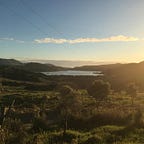“Zero F@#ks” (and insights into what our rangatahi do care about)
Kaitāia, in the Far North of Aotearoa New Zealand. Just this week I’ve seen so many examples of people beyond caring what other people think of them. While driving on the main road a car has come screeching around the corner and hurtling, out of control, straight towards us. I’ve quietly pulled over and silently hoped that innocent people aren’t hurt. Out of the same road but earlier on in that week, a person on foot throwing a rock at a car, screaming. I’m sitting outside of my car on my phone while she comes running past yelling and trying to catch this car.
She looks at me while she’s running, face contorted, bellowing, “what you f@#kin’ looking at?”, and I say (okay… I think), “humpf, not you!” Anyway, there’s a lot of drama up the street and eventually, the police catch up with it all.
That’s only two of a handful of incidences that week that just ‘happen’ here in the place that I live and work. The thing about people being uncaring with their attitudes and actions is that seemingly, it’s contagious. Others who may care, who have been brought up to care, who are connected to people, whenua, culture; well, you can see how inevitably, people can start sliding with their caring. Watching people park in the allocated disabled parking without a care is a regular occurrence at our one and only supermarket in town. Does sliding into the abyss of uncaring make people more susceptible to it continuing on into other aspects of their lives? Earlier on this month, someone must have helped themselves to a couriered package of mine from our doorstep. Who does that? People who give zero f@#ks do that… and the very very worst thing about it is that our kids are witnessing all of this being modelled to them too, and they learn fast not to care about much neither. It really is heartbreaking.
In February this year, our little kaupapa Māori organisation, Te Korowai Aroha Whānau Services went out on a limb and tried a different way of engaging with our youth. We kicked off HUA Rangatahi; a kaupapa focused on giving our young people an opportunity to work out in a free youth gym. We followed the vision of Hone Wikitera, my husband who has trained as a PT and worked in this community for years, and who had done mahi in systems innovation and could see that very little was shifting for our rangatahi. Our organisation also through our Ministry of Social Development funding, He Poutama Rangatahi, was in kura and the community supporting those in or at risk of NEETs (not in education, employment or training) rangatahi to pathway into further education and careers.
Through our kaitūhonohono/connectors with our kaupapa project He Ara Whānui He Ara Tētēkura! (a wide pathway, a pathway for leaders!) we have been able to support over 60 rangatahi with a range of different opportunities, which has been amazing for us to be involved in up here in the Far North.
It’s been about 10 months since HUA Rangatahi has been operational, and there’ve been so many interesting things that have happened. Firstly, the kids flock to our little HUA hub. They can’t get enough of it, and on average we may have anywhere between 20 to 60 kids a day using the equipment and facilities. We have community organisations bring their rangatahi in to use the facilities as well, and as such, we have several MOUs with these entities to ensure that everyone is on the same page when it comes to our young people and kaupapa. The second interesting thing is that many of these kids may come in at first uncaring, but you do see the attitudes change.
The most noticeable change is that you see that they do start caring about what they can do whilst at HUA Rangatahi. They start caring about lifting weights, their technique, the number of weights they can lift, their boxing technique, their exercise regime. These kids really start to give a damn about what they’re doing while using the equipment.
The other thing that happens is that they start opening up. We hear about how a young person hasn’t seen his mum since he was four and now, he’s 14. How a couple of kids must leave their house early in the weekday morning because people are still drinking there from the night before, how these young people are treated by society, community, schools, teachers, parents. It’s relentless. So, they come to HUA Rangatahi and just go for it. It’s a place where you must care a little bit about things. Make sure you look after the equipment, otherwise it might break and then (like our pakaru treadmill at the moment) it can’t be used. Make sure you don’t take things that don’t belong to you, otherwise the consequence of those behaviours is that the HUA shuts down while things get returned (it took just a week of being closed for that to happen).
Our kids care, because it comes out in blips when they’re talking with Hone. We’re not pretending that we’re solving anything, all we have is this dedicated space and some time for young people, and the magic formula at the moment is that it’s supporting them to give a f#@k about something.
